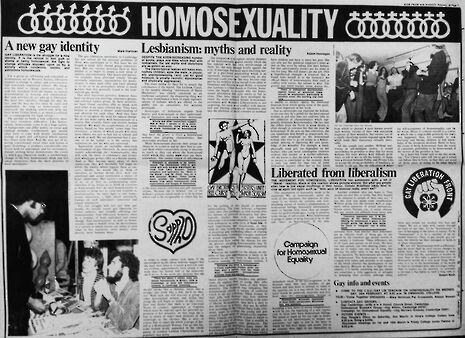800 editions: the cultural zeitgeist
One of this term’s Features Editors asks: how much has Cambridge changed since 1947?

George Orwell famously said that Britain can “can change out of recognition yet remain the same”. The same is very much true of Cambridge. Having a slight penchant for puerility, I spent several hours in the Varsity offices on Sunday scouring the archives for the story of how, in 1992, the then Corpus drinking society, the Chess Club, got itself banned and several members sent down after they drunkenly knocked on the door of the Master’s Lodge at 3 a.m. and urinated on the Master’s wife. Alas, that debauched tale clearly escaped Varsity’s attention.
However, I was struck by a front page from March 1992 – “Labour tops general election poll”. This was almost exactly the same as the headline that ran in March this year. In both cases, Varsity polls suggested that students narrowly supported Labour; in both cases, the result mirrored that of national polls belied by the results at the ballot box. Similarly, as noted in the news section this term, concerns about issues such as the council cutting back on street lighting, or the launch of a sexual consent campaign, have recurred over the years.
Yet perhaps even more striking are the changes that show just how much the zeitgeist has moved on. A particular curiosity of Varsity in the early ’90s is what seems an insistent focus on Enoch Powell, and a salient comment in an editorial is on how “old-fashioned” his views are –the most notable of these in the Editor’s mind is that Powell didn’t think we should be “in Europe”. This illuminates how far the debate on British membership of the EU has moved into Europhobic terrain in the past 20 years, but perhaps even more significant is the fact that it was this, not Powell’s notorious attitude to race, that was deemed terribly démodé.
Indeed, while the early ’90s seems recent in the public consciousness, perusal of Varsity issues shows just how much popular opinion has changed on social issues since then. Mary Whitehouse is another reactionary who surfaces a surprising amount in the pages of this paper in this era. The most amusing – yet shocking – instance of this is when she refers to a lesbian “pash” (a magnificent word which really should be brought back into popular discourse) on the head of games at school when she was 13. This is in the context of her assertion that many people experience a period of latent homosexuality, and her suggestion that Section 28 was a positive force because it made it less likely for such a “pash” to be pursued. But, alarmingly, this isn’t shot down as a horrifically unpleasant expression of homophobia; the author doesn’t express support of Whitehouse’s view, but creates no impression that her stance is anything remarkably out of the ordinary.
Section 28 was the topic of many pieces in the late ’80s and early ’90s, but often explored as an issue on which there were two reasonable sides to the argument. As the ’90s progress, it becomes clear that a slow, subtle process of social liberalisation has seeped through into the public discourse; there are fewer examples of tacit acceptance of the possible legitimacy of the views of figures such as Powell and Whitehouse. But there is an attention-grabbing interview with Ian Hislop in 2001, in which he casually refers to Peter Mandelson as a “queen”, and there is no sense of the insensitivity of this term being challenged – this is unimaginable in the Varsity of 2015.
Student papers only reflect a cross-section of broader public attitudes. But, to paraphrase and summarise the ideas of Michel Foucault, the way in which terms are used and issues are discussed reflects the dominant attitudes of predominant societal power structures and vice versa. The way students write in Varsity reflects some aspect of the cultural zeitgeist. And even though there are of course an array of manifest problems with racism, sexism and homophobia – often in insidious forms – in Cambridge and Britain today, looking at Varsity issues from the recent past shows just how much progress has been made as social liberalism has pushed forward.
 Comment / Anti-trans societies won’t make women safer14 November 2025
Comment / Anti-trans societies won’t make women safer14 November 2025 News / Controversial women’s society receives over £13,000 in donations14 November 2025
News / Controversial women’s society receives over £13,000 in donations14 November 2025 News / John’s rakes in £110k in movie moolah14 November 2025
News / John’s rakes in £110k in movie moolah14 November 2025 Fashion / You smell really boring 13 November 2025
Fashion / You smell really boring 13 November 2025 Music / Three underated evensongs you need to visit14 November 2025
Music / Three underated evensongs you need to visit14 November 2025









